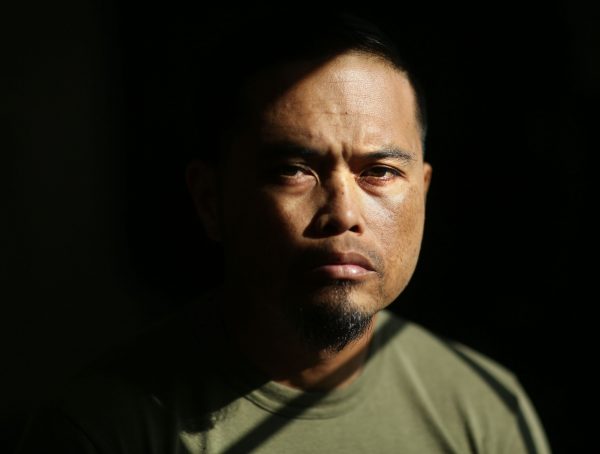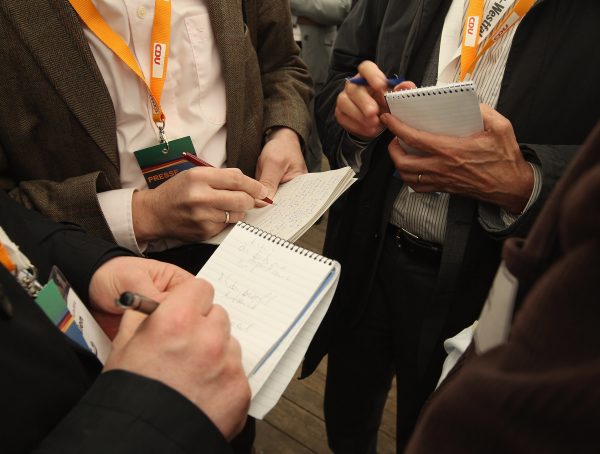 Interviews are an essential building block for just about every news story, so it’s obviously important to know how to conduct a good one. Most interviewing advice comes in the form of tips and hints, like these dos and don’ts from Canadian journalist John Sawatsky and the suggestions we’ve previously posted here. But sometimes it’s helpful to take a step back and think less about specific interviewing tactics and more about overall strategy.
Interviews are an essential building block for just about every news story, so it’s obviously important to know how to conduct a good one. Most interviewing advice comes in the form of tips and hints, like these dos and don’ts from Canadian journalist John Sawatsky and the suggestions we’ve previously posted here. But sometimes it’s helpful to take a step back and think less about specific interviewing tactics and more about overall strategy.
Freelance writer J. Maureen Henderson lays out some of that strategic thinking in a post at Forbes, “On Becoming Barbara Walters.”
If done right, interviewing is actually a neat little game – you use all of your investigative and interpersonal talents (asking, listening, analyzing) to engage another person in conversation, mine that interaction for useful information and then use that information to create or augment a compelling story. You need to be perceptive, inquisitive, adaptable and more than a little bit crafty.
For Henderson, the first step is knowing the story you want to tell. Absolutely right. Like a good story, a good interview should have a focus. That doesn’t mean you’ve outlined your script in advance and you’re just looking for a sound bite to plug in. (I’ve seen reporters who worked that way, believe it or not, and while they never missed deadline their stories were always pedestrian at best.)
An interview is a conversation with a purpose and the reporter is (or should be) in the driver’s seat. You need to be open to unexpected detours, but you also need a road map to remember where you’re going. You should know what questions you plan to ask and why you’re asking them. What is the point of talking to this person, anyway? If you don’t know, you’re probably wasting their time and yours.
Henderson also advises interviewers to “leave yourself out of it.”
There’s a fine line between building a rapport and comfort level that gets you the juiciest candid quotes and being obsequious and fawning in your attempt to bond with your subject. Recognize the line and stay on the professional side of it.
I agree, up to a point. Not that I’m in favor of fawning or unprofessional conduct, of course. But you want to come off as a real person, not a robot, especially if you’re interviewing “ordinary” people who need to be put at ease. Under those circumstances, it’s OK to open up a bit to the person you’re interviewing, as long as you remember there’s only one star in an interview and it’s not you.









2 Comments
I’m not sure I would call interviewing a game. It is not a win or lose situation. The best interviews are often those where both parties feel they have had an honest exchange of perspective…often an exchange that goes off in unexpected directions.
The core of any strong interview is a well conceived set of questions…prepared in advance but ready to be discarded for better questions.
The better the questions, the better the interview. Questions are an act of the hear and now. They force you to be part of the conversation, to make an immediate exchange of ideas, while sharpening your mind to focus on what is wanted.
That said, questions don’t have to be left for the moment. Good questions are tools that provide direction, clarity, and resolution to the interview. By thinking in advance of how you can bring order to the interview through the types of questions, the sequence, and the anticipated answers, you can discover what opportunities the interview offers for the genuine advancement of your knowledge and insight…and by extension…the service you can provide to viewers of giving them knowledge and insight they did not have before your story was shared with them.
Examining your questions requires you to be aware of what you don’t know. If you don’t have compelling questions to ask, questions you are sincerely interested in learning the answers to, you could be simply going through the motions. One of the first signs of burnout that I’ve noticed among some journalists is their failure to ask good questions…bored or tired, people turn off their questions…and their curiosity.
[…] کې ويډيوي مرکه کول اړينې لوستنې: How to interview almost anyone https://www.newslab.org/2012/01/04/how-to-interview-almost-anyone/ صنفي فعاليت: د باتجربه کس سره مرکه کورنۍ دنده: د راډيوي […]